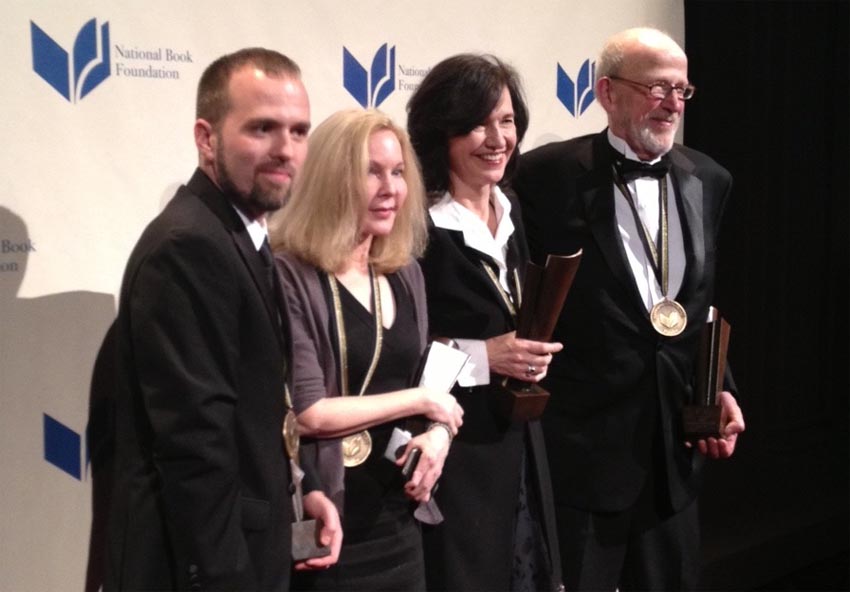Despite the slight efforts to amp up the glam factor, Thursday night’s National Book Awards was an evening for readers. The readers — whether authors, publishing people, journalists, or people who sauntered into the swank ballroom from the street — drank vast quantities of alcohol and scarfed down canapés and danced to butchered remixes of “Staying Alive.” While dodgy slices of cheese pizza went largely untouched, this reporter observed pigs in a blanket traveling down dark gullets well after the midnight hour. This reporter also participated in this snacking, inspired in part by numerous shots of scotch downed not long before.
More importantly than these stray gustatory observations, the readers won the awards. William Alexander name-checked Ursula K. Le Guin upon winning the Young People’s Literature award for Goblin Secrets. He was so startled at his victory that he had modest difficulty exiting the stage, moving left and right and left and right until he figured out this Hanayama chain puzzle writ large with a bit of instinct. The awkward cue from Robbie Williams’s “Millennium” which played throughout the evening vexed certain audience members, but Elmore Leonard’s stirring speech for a lifetime award was a rousing corrective to Tom Wolfe’s rambling nonsense from two years before.
“The only thing I’ve ever wanted to do in my life is have a good time writing stories,” said Leonard to a very appreciative crowd who offered him a standing ovation. “This award tells me I’m still at it.”
Leonard’s presentation was buttressed by an introduction by Martin Amis, who declared, “The essence of Elmore is to be found in his use of the present participle.” Amis may have been toying with the audience. His bowtie was crooked. He read Leonard’s pulp prose with a modest froideur. And while he didn’t sprint from reporters like Dave Eggers, Amis was out the door before the ceremony was over. Several observers I talked with hoped he would take this cheeky act on the road. But this banter halted when it was understood that more important matters needed to be considered: namely, the titles up for consideration.
Katherine Boo’s Behind Beautiful Forevers trounced veteran historian Robert A. Caro in the Nonfiction category. “If this prize means anything,” said Boo upon accepting the award, “it’s this. Small stories matter.” This reporter felt that it was more than a bit boorish to offer superficial questions to a first-rate journalist who had spent years of her life earning the trust of those who lived in the makeshift settlement of Annawadi. I told Ms. Boo how much I had loved her book. She offered me a hug.
Upon winning the Fiction award, Louise Erdrich thanked the tuxedoed throng for giving The Round House “a wider audience.” Both Erdrich and Boo were spotted on the dance floor having a very good time, with Erdrich sneaking into a Kobo kiosk to take silly photos.
To gauge the level of literary enthusiasm, this reporter danced virulently on the mezzanine floor, bouncing up and down with preternatural energy. Through the use of sense memory from his clubbing years in his twenties, this reporter was able to sway his arms excitedly in the air and spin on his heel in a matter approximating John Travolta in his peak years. These efforts were received with considerable hoots and hollers by several women on the floor — in large part because this reporter was one of the few men dancing.
But some of the poets, despite their advanced years, were also busting some moves. Earlier in the evening, this reporter was perturbed to see the poets rebuffed by the smug know-it-alls at Book TV. In an effort to correct this oversight, this reporter chatted with them.
“I’m told by the publisher that it sold some books,” said poet David Ferry about being nominated for the Poetry award, “which for a poet is a surprise and a pleasure.” The 88-year-old Ferry had been writing poetry since he was 25. One of Ferry’s best friends was fellow nominee Alan Shapiro. “We sort of whisper endearments into each other’s ears.” When I discussed the state of poetry with both Ferry and Shapiro, pointing out that Judi Dench had recited Tennyson’s “Ulysses” in the latest James Bond film Skyfall, Shapiro observed that poetry was the first “technology of feeling.”
Ferry would go on to win the Poetry Award for Bewilderment. He was tongue-tied and bewildered on stage, but he was grateful to be recognized.
